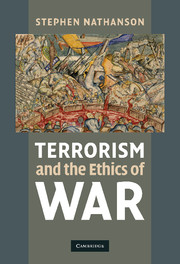Book contents
- Frontmatter
- Contents
- Acknowledgments
- Introduction
- PART I TERRORISM: WHAT'S IN A NAME?
- PART II WHY MORAL CONDEMNATIONS OF TERRORISM LACK CREDIBILITY
- PART III DEFENDING NONCOMBATANT IMMUNITY
- Introduction: the ethics of war-fighting: a spectrum of possible views
- 8 The realist challenge to the ethics of war
- 9 An ethic of war for reasonable realists
- 10 Walzer on noncombatant immunity as a human right
- 11 The supreme emergency exception
- 12 Rights theories, utilitarianism, and the killing of civilians
- 13 Immunity rights vs. the right of self-defense
- 14 A rule-utilitarian defense of noncombatant immunity
- 15 Why utilitarian criticisms of noncombatant immunity are mistaken
- 16 Is noncombatant immunity a “mere” convention?
- PART IV HOW MUCH IMMUNITY SHOULD NONCOMBATANTS HAVE?
- Conclusion: terrorism and the ethics of war
- Bibliography
- Index
11 - The supreme emergency exception
Published online by Cambridge University Press: 05 June 2012
- Frontmatter
- Contents
- Acknowledgments
- Introduction
- PART I TERRORISM: WHAT'S IN A NAME?
- PART II WHY MORAL CONDEMNATIONS OF TERRORISM LACK CREDIBILITY
- PART III DEFENDING NONCOMBATANT IMMUNITY
- Introduction: the ethics of war-fighting: a spectrum of possible views
- 8 The realist challenge to the ethics of war
- 9 An ethic of war for reasonable realists
- 10 Walzer on noncombatant immunity as a human right
- 11 The supreme emergency exception
- 12 Rights theories, utilitarianism, and the killing of civilians
- 13 Immunity rights vs. the right of self-defense
- 14 A rule-utilitarian defense of noncombatant immunity
- 15 Why utilitarian criticisms of noncombatant immunity are mistaken
- 16 Is noncombatant immunity a “mere” convention?
- PART IV HOW MUCH IMMUNITY SHOULD NONCOMBATANTS HAVE?
- Conclusion: terrorism and the ethics of war
- Bibliography
- Index
Summary
If Walzer's ethic of war-fighting consisted entirely of a strong prohibition on intentional attacks on civilians and a restrictive rule regarding collateral damage killings, it would provide a strong basis for condemning all terrorist acts. But, as we have seen, Walzer does not see noncombatant immunity as an absolute, exceptionless constraint on how war may be fought. Instead, he believes that under “supreme emergency” conditions, noncombatant immunity gives way, and civilians become permissible targets.
PROBLEMS WITH THE SUPREME EMERGENCY VIEW
In spite of the plausibility of the supreme emergency doctrine, it raises serious problems, both in itself and in its relations to other aspects of Walzer's ethic of war. The most obvious problem is the inconsistency between Walzer's supreme emergency doctrine and his categorical condemnation of terrorism. If terrorism is, as Walzer says, the random or indiscriminate killing of civilians for the sake of a political goal, then the pre-1942 British bombings of German cities were terrorist acts. These attacks certainly satisfy the conditions in the definition of terrorism I have defended. They were acts of serious, deliberate violence that were committed as part of a campaign to promote a political agenda, the defense of Britain from German attack. They targeted large but limited numbers of people in order to influence a larger group and the leaders who make decisions for it.
- Type
- Chapter
- Information
- Terrorism and the Ethics of War , pp. 146 - 159Publisher: Cambridge University PressPrint publication year: 2010



